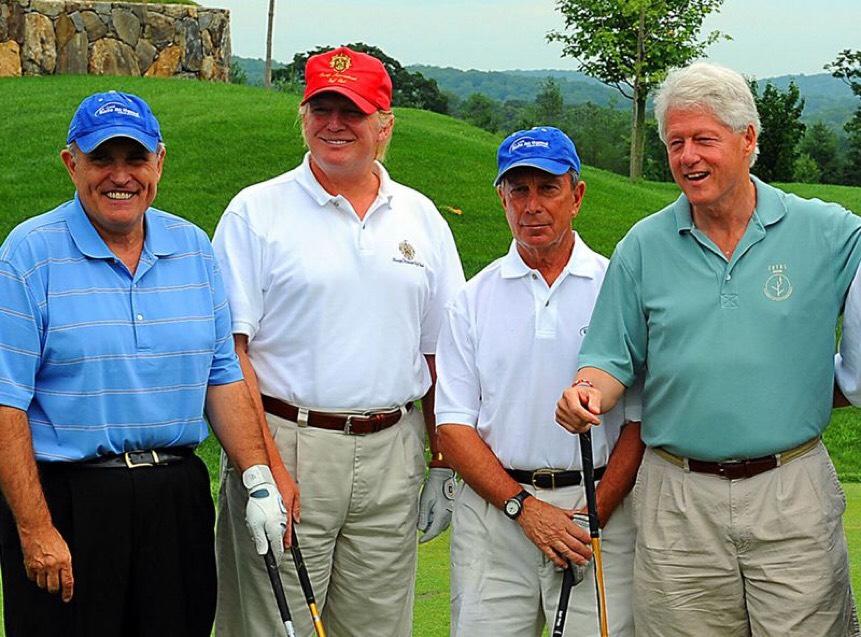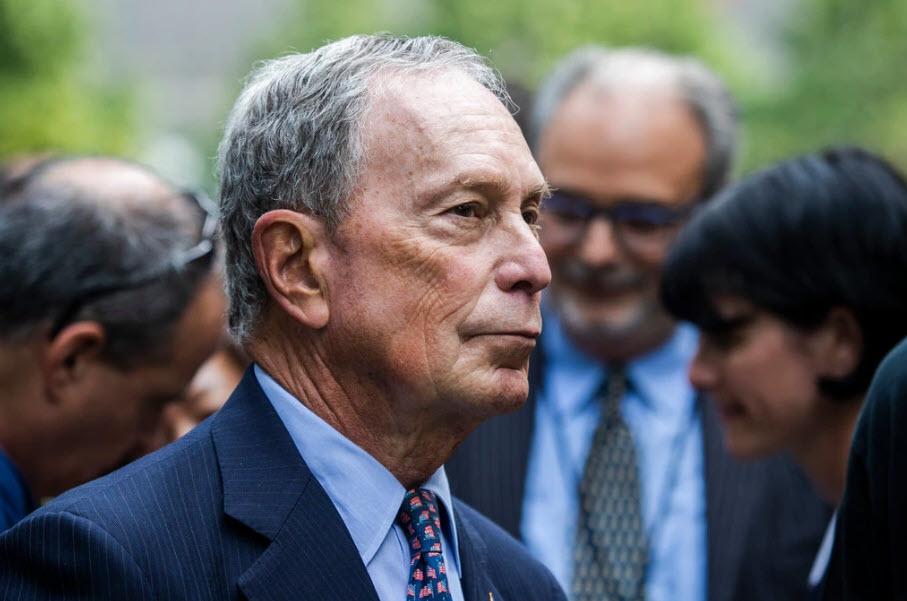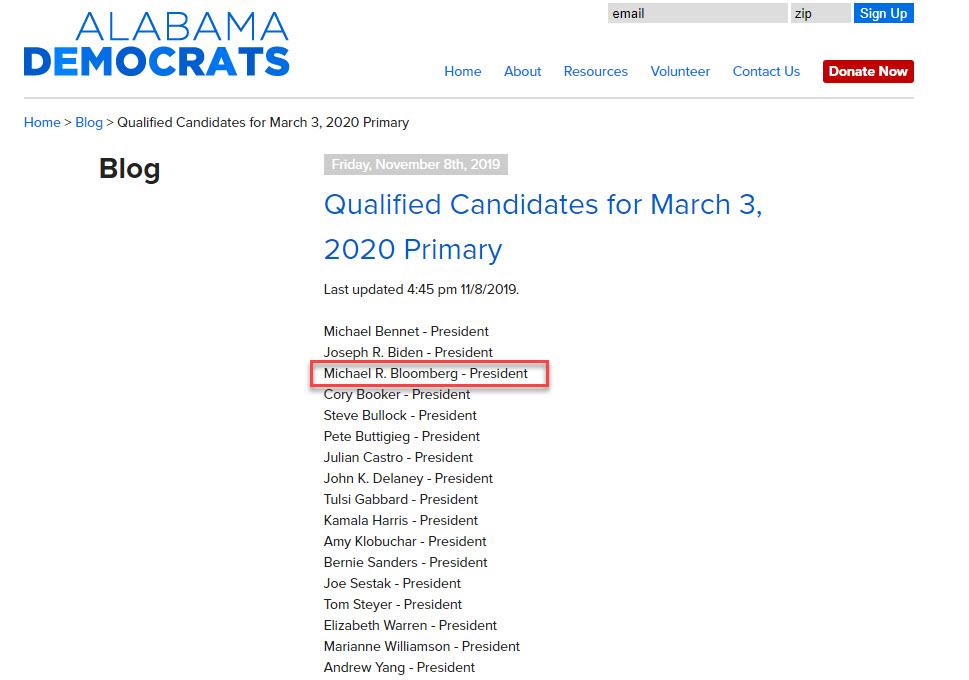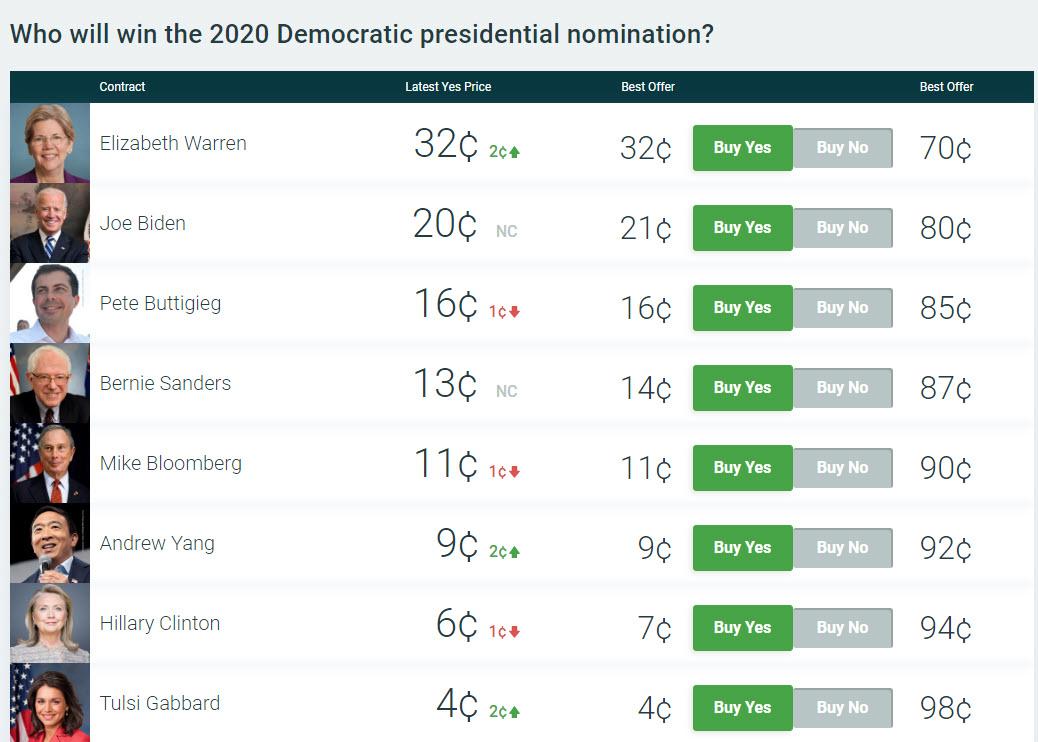Bloomberg Officially Files Paperwork For 2020 Presidential Primary
As was first reported yesterday, late on Friday former New York City Mayor Michael Bloomberg officially filed as a candidate for the Alabama Democratic presidential primary, entering a White House run that is sure to shake up the already-crowded 2020 field.
At 4:35pm, the Alabama Democratic Party updated its website to indicate that Bloomberg had filed the necessary documents ahead of the state’s registration deadline on Friday. The southern state has the earliest deadline in the country, Nov. 8, for candidates to qualify for the primary ballot, forcing Mr. Bloomberg to put his name into contention this week if he did not want to get shut out of the ballot.
Bloomberg said in March that he would not run for president but warned that the ultimate Democratic nominee should not take progressive policy positions that would “drag the party to an extreme that would diminish our chances in the general election.” Yet as the Hill notes, speculation had swirled that Bloomberg was reconsidering his decision especially after Joe Biden started trailing Liz Warren badly in the polls, and was behind Bernie Sanders in fundraising.
With his late entry and a personal fortune of $53.4 billion according to Forbes, Bloomberg could jolt the Democratic primary race, hurting the chances of other centrist candidates such as Joe Biden and Pete Buttigieg. While Bloomberg has not made a final decision to run, his allies say he intends to enter the race and his early moves have rippled through the rest of the Democratic field.
Predictably, Bloomberg’s decision has raised alarm among supporters of former VP Joseph R. Biden who is presently the leading centrist in the race, and prompted accusations from Senators Elizabeth Warren and Bernie Sanders that Bloomberg is going to try to buy the presidency.
The former mayor would also enter the race as the top target for progressives such as Elizabeth Warren and Bernie Sanders, two outspoken, progressive liberals who have argued the rich hold too much sway in U.S. politics and have unveiled a litany of plans hinged on raising taxes on the wealthiest Americans.
“The wealthy and well connected are scared,” Warren’s campaign said in an email to supporters as news broke that Bloomberg was considering a run. “They’re scared that under a Warren presidency, they would no longer have a government that caters to their every need. So they’re doing whatever they can to try to stop Elizabeth and our movement from winning in 2020 and bringing big, structural change in 2021.”
In perhaps the strongest sign yet that his candidacy would scramble the existing race, the NYT reports that Bloomberg has decided that if he seeks the Democratic nomination, he would stake his candidacy on big, delegate-rich states like California and Texas, which vote somewhat later in the calendar, rather than trying to catch up with his rivals in the circuit of traditional early states.
“We now need to finish the job and ensure that Trump is defeated — but Mike is increasingly concerned that the current field of candidates is not well positioned to do that,” Howard Wolfson, a close adviser to Bloomberg, tweeted on Thursday. He added that “based on his record of accomplishment, leadership and his ability to bring people together to drive change, Mike would be able to take the fight to Trump and win.”
If Bloomberg proceeds with such a campaign, he would be attempting to take a high-risk route to the Democratic nomination unprecedented in modern presidential politics — one that shuns the town hall meetings and door-to-door campaigning that characterizes states like Iowa and New Hampshire, and relies instead on a sustained and costly campaign of paid advertising and canvassing on a grand scale.
In short, he would try to buy the presidency, and he won’t even have to promise every American a Bloomberg terminal.
Such an approach would amount to a bet that no other candidate emerges from that early-state circuit with the kind of momentum that could overwhelm whatever operation Bloomberg has built in the Super Tuesday states that vote in early March. It would also likely enrage Democratic Party leaders in the early states, several of which are key battlegrounds in the general election, and intensify complaints from Bloomberg’s opponents about his reliance on personal wealth.
Still, it may be just what centrist Democrats want: Bloomberg will enter the race looking to become the candidate for swaths of Democratic voters who fear that progressive policies will prove too liberal in key swing states that President Trump won in 2016.
A New York Times/Siena College poll released Friday found that a majority of Democrats surveyed in six battleground states — Arizona, Florida, Michigan, North Carolina, Pennsylvania and Wisconsin — prefer a more centrist-minded candidate who promises to find common ground with Republicans.
And yet despite virtually unlimited funds, and having a firm lane in which to run, Bloomberg’s path to the 2020 nomination will be far from easy.
Bloomberg’s potential bid drew immediate criticism that he was just another wealthy businessman trying to buy an election.
Bloomberg will face questions about his record as a three-term mayor of New York, particularly from the Democratic Party’s vocal progressive wing, and about why he is needed in a race that still has 17 candidates vying to challenge Republican President Donald Trump in November 2020.
“There is no constituency for Michael Bloomberg that isn’t already taken by one of the candidates who are already running,” said Charles Chamberlain, chair of the Vermont-based progressive group Democracy for America.
He will also face criticism for New York’s implementation of “stop and frisk,” a policy that allowed police to stop and search people on the street that was decried as racist for overwhelmingly targeting black men. African-American voters are a critical Democratic voting bloc. Bloomberg has also been panned for attempting to ban sodas sold in cups larger than 16 ounces, a proposal that drew national criticism for supporting a “nanny state” that was ultimately struck down by New York courts.
But Bloomberg is skeptical that any of the current candidates can beat Trump, according to a spokesman. It also suggests that Bloomberg is skeptical the attempt to impeach Trump will prove successful.
Which is why Bloomberg’s entry into the race may have been the best news Trump has received in recent months.
Meanwhile, opinion polls show three contenders battling at the top of the Democratic race: U.S. Senators Elizabeth Warren of Massachusetts and Bernie Sanders of Vermont, who lead the progressive wing, and moderate Joe Biden, the former vice president. On online betting websites, Bloomberg is also trailing, and after an initial burst on Thursday, he has stabilized in 5th place, just after Bernie Sanders.
Bloomberg has been critical of Warren and her desire to institute a tax on the super-wealthy, which she would use to fund programs ranging from universal healthcare to free college tuition. Biden, meanwhile, has turned in uneven debate performances and lagged behind his top rivals in fundraising. Bloomberg would likely seek to appeal to the same moderate voters drawn to Biden.
“It’s almost like he’s running because this billionaire wants to stop Elizabeth Warren,” Brad Bannon, a Democratic strategist who advises progressive groups and labor unions, said of Bloomberg. “It’s lousy for Joe Biden but great for Elizabeth Warren.”
And Donald Trump, of course.
Public opinion polls show most Democrats do not share Bloomberg’s dissatisfaction with the contenders. A Monmouth University poll taken in late October and early November found three-fourths of Democrats were satisfied with their choice of candidates and just 16% wanted someone else.
Then there is his age: Bloomberg, the CEO and founder of Bloomberg LP, would be the second-oldest candidate among the Democrats in a race where age has been an issue. Sanders, who took time off the campaign trail after a heart attack, is 78. Biden is 76, and Warren is 70. Trump is 73.
Bloomberg also will face questions about his decision to run for New York mayor in 2001 as a Republican. He switched to independent before he ran for a third term in 2009. In 2018, while weighing whether to run for president, he switched his party registration again and became a Democrat.
After leaving office, he emerged as one of the strongest supporters of gun-control measures, pouring millions of dollars into advocacy groups that push for measures to ban the sale of some guns and make it harder to purchase others.
And while he is a staunch environmentalist, Bloomberg is a helicopter-flying fanatic who also owns several private jets. In October 2004, officials with the Meadowlands Sports Complex denied Mr. Bloomberg’s request to fly his helicopter to a Jets game and encouraged him to take the bus from the Port Authority Bus Terminal. In January 2002, when he was criticized for taking the controls of a police helicopter to attend Adolfo Carrión Jr.’s inauguration as borough president in the Bronx, he defended himself, saying, “I fly helicopters more sophisticated than that all the time that I happen to own.”
Of course, having enough money to buy his own polling company, Bloomberg is aware of all these shortcomings and yet he still appears eager to run.
Bloomberg is seen as considering skipping the early primary and caucus states of Iowa, New Hampshire, Nevada or South Carolina, to focus instead on Super Tuesday as he builds out his campaign infrastructure. However, Democrats in those states still hope to hear from Bloomberg.
New Hampshire Democratic Party Chairman Ray Buckley and Iowa Democratic Party Chairman Troy Price issued a rare joint statement on Friday pushing Bloomberg to visit their states if he mounts a presidential bid.
“We are excited that this Democratic presidential nomination contest has so many qualified candidates who all have plans to grow our economy, make quality health care more accessible, and make college more affordable, and we are certain that Granite Staters, Iowans, and other early state voters are eager to ask Michael Bloomberg about his plans to move our states and our country forward,” Buckley and Price said. “We hope that they will have that opportunity.”
“It’s going to be difficult, but we’ve never really seen a candidate with this amount of resources at his disposal. That could perhaps make up for a lot of groundwork and a lot of time here,” said veteran Iowa Democratic operative Grant Woodard, an aide to Hillary Clinton in 2008.
“A lot of people here haven’t made up their minds,” he added. “There could still be an opening for him.”
Who knows, perhaps in this age of billionaires, the US presidency really does end up going to the highest bidder.

Tyler Durden
Fri, 11/08/2019 – 19:28
via ZeroHedge News https://ift.tt/32vKrEk Tyler Durden


